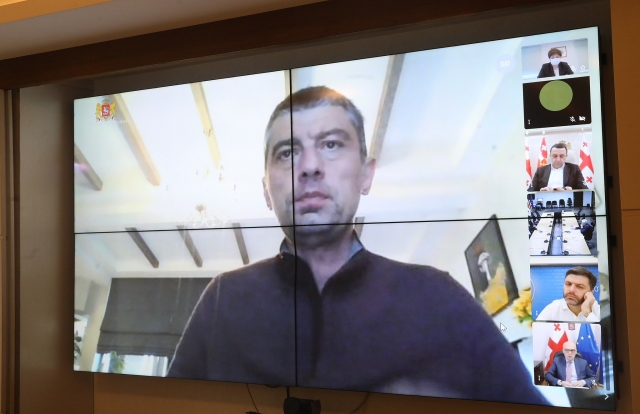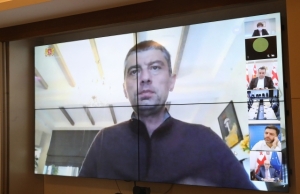New Decisions of Georgian Gov't Related to Coronavirus
Wearing face masks will become mandatory outdoors as well as in; restaurants throughout Georgia will be allowed to remain open only until 22:00; the education process in the schools of Tbilisi, Kutaisi, Rustavi, Telavi, Zugdidi, Zestaponi, Gori, Poti, Marneuli, and Gardabani will continue remotely until 25 November. The aforementioned decisions were made by the Interagency Coordination Council during today's session, which was held via video conferencing, and chaired by Prime Minister Giorgi Gakharia.
It was once again noted during the session of the Council that the face mask is recognized worldwide as one of the best means of slowing down the spread of the virus; therefore, the use of face masks by citizens both indoors and outdoors is now considered of particular importance as the correct use of face masks by 90% [of the population] is said to reduce the risk of the spread of infection by 70%.
Due to the increased risk of the spread of the virus, the restriction that applied to restaurants operating in Tbilisi, Mtskheta Municipality, Kutaisi, and Batumi will apply throughout Georgia, and all restaurants will have to close at 22:00. Additionally, social events such as weddings, wakes, birthdays, baptisms, etc. remain restricted.
Some polling stations were located in schools, which is why the schools that housed polling stations temporarily transitioned to remote operation from 28 October in order to allow the preparatory works for the elections and the subsequent clearing away to take place. Given the epidemiological situation, and in order to reduce mobility in big cities, the education process in grades 1 through 12 in both public and private schools in Tbilisi, Rustavi, Kutaisi, Telavi, Zugdidi, Zestaponi, Gori, Poti, Marneuli, and Gardabani will continue remotely until 25 November.
Higher education institutions, vocational education institutions, and kindergartens will continue to operate as they did until today.
The members of the Council discussed the growing pattern of the global number of people infected with coronavirus. They also discussed the epidemiological situation in Georgia and the country's strategy, which entails the use of pinpoint and local approaches during the stage of adaptation and virus management, instead of the imposition of systemic restrictions.
The Interagency Coordination Council also discussed the situation in clinics and the efficient operation of the primary level of healthcare. It was noted that family doctors of insurance companies are also involved in the process of managing the treatment of patients with mild cases of infection, who are undergoing treatment at home. According to the Ministry of Healthcare, the Central Online Clinic, which systematically monitors patients who are being treated at home, as well as those who are self-isolating together with them, is also functioning effectively. If a patient's condition worsens, the Clinic ensures that the appropriate steps are taken in response. As Healthcare Minister Ekaterine Tikaradze noted, more than 33,000 cases have been managed since the Central Online Clinic was launched. The online clinic is staffed with doctors, junior doctors, residents, and operators who have already undergone special training.
As of today, 44,522 laboratory-confirmed cases of coronavirus infection have been detected in Georgia, of which 28,633 have already recovered. 362 people have died.
At this stage, 3,080 people are in quarantine, 2,264 citizens are receiving treatment at COVID hotels, while 4,253 people are hospitalized under medical observation.
The Parliament of Georgia, headed by Chairman Archil Talakvadze, and the Administration of the President are actively involved in the work carried out by the Interagency Coordination Council, which operates under the leadership of the Prime Minister.












